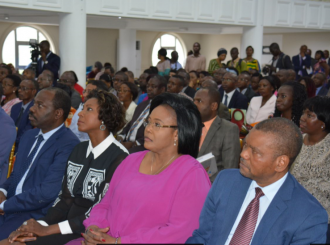
Libreville, 28 February, 2020 (ECA) - Improving the competitiveness of businesses; raising awareness of all stakeholders; setting up an active national AfCFTA implementation committee; synergy between the public and private sectors; continued support from technical partners such as the UN Economic Commission for Africa (ECA); structural reforms leading to the removal of tariff and non-tariff barriers to increase productivity, promote the emergence of regional and continental chains and lead Africa in general and Gabon in particular to a 'future we want'!!!
There lies a summary of the recommendations from two days of the National Awareness –Raising and Information Forum on the African Continental Free Trade Area (AfCFTA) for Gabonese actors, held from 26 to 27 February, 2020 in Libreville. The activity was facilitated by the ECA through its African Trade Policy Center (ATPC) and its Subregional Office for Central Africa, with European Union funding.
During the forum, the Gabonese authorities made a firm commitment to “actively and objectively” implement the recommendations made by more than 140 participants from the public sector, the private sector, civil society and the academia, as was indicated at the closing ceremony, by Mr. Barthelemy Ngoulakia, Permanent Secretary at the Ministry of Tourism, Trade, Small and Medium Enterprises, and Industry of Gabon, representing the Minister, Mr. Hughes Mbadinga Madiya, who was unavoidably absent.
Find below the conversation between the communication section of ECA and Minister Hughes Mbadinga Madiya on the impact of the Forum for the Gabonese nation.
ECA Communication: What do you see as the challenges that Gabon will face as it integrates itself into the AfCFTA?
Minister Mbadinga: The AfCFTA already represents an opportunity for Gabon because it is access to a large market of 1 billion, 200 million people. The challenge for Gabon will be to define the key axes through which, by taking advantage of this opportunity, we could enter this large market in terms of creating value and creating jobs for our population.
What will be the guidelines of your strategy?
[We are going to draw inspiration from] the strategy of the [Gabonese] Head of State, which we have been rolling out for more than a decade, now. This is the work of the Emerging Gabon Strategic Plan for an Industrial Gabon. We will build our strategies on our strengths. Among our strong points, is the strategy for the diversification of the wood sector with economic zones such as that of Nkok [situated 27km from Libreville, the capital]. We will also build on the others, that is, the start of diversification [actions] taking place in other sectors, notably the mining sector. In addition, we will continue to rely on what the President of the Republic has called the Gabon of Services – based on those services in which Gabon can perform strongly. These are banking services, telecommunications services, [and] tourism. These are the solid axes through which Gabon will be able to pitch its game with regards to this great AfCFTA challenge.
And precisely for Gabon to pursue economic diversification and industrialization in order to take advantage of the AfCFTA, you need skills. How will you build these skills, especially toward value addition?
But Gabon is open! We must already count on our own strengths such as the link between the public policies that are implemented by the highest authorities, notably the President of the Republic and the Prime Minister - Head of Government. Then, it will be necessary, thanks to this scheme of things, to attract suitable investments. So, skills will be built as we enter investment cycles. Skills cannot be spontaneously generated. They are the product of investment. It will play out as we acquire state-of-the-art infrastructure, improve our human resources, and get skills transfer. These are all key elements of the skills that will allow us to succeed in both our industrial and services strategies.
-END-
Media Contact
Abel Akara Ticha - Communication Officer
United Nations Economic Commission for Africa
637, rue 3.069, Quartier du Lac, Yaounde, Cameroon
Tel: +237 222504348
E-mail: akara@un.org